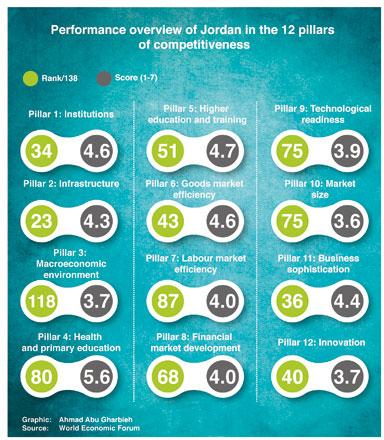You are here
Jordan records slight progress in competitiveness index
By Omar Obeidat - Sep 28,2016 - Last updated at Sep 28,2016

AMMAN – Jordan's competitiveness ranking worldwide and regionally improved on the World Economic Forum’s (WEF) Global Competitiveness Index (GCI) 2016-2017.
Advancing by one place from last year, Jordan ranked 63rd globally among 138 countries and sixth among the 22 Arab countries, registering a score of 4.3, according to the GCI, which was released on Tuesday and a copy of which was made available to The Jordan Times.
In its comments on Jordan, WEF said the Kingdom made the slight jump despite the daunting challenges it has to face as a result of the geopolitical situation in the region, adding, however, that Jordan has the advantage of having a fairly efficient goods market (ranked 43rd in this category) because of a certain intensity of domestic competition that raises the efficiency of firms.
The report said the country also has relatively efficient financial markets (33rd), although trustworthiness and confidence in the financial sector needs to be strengthened (107th) while it said the labour market has some flexibility (29th).
The report said Jordan can take advantage of its fairly vibrant business sector (36th) and healthy level of adoption of technologies from abroad (40th) to achieve a higher, more sustainable growth path, adding that addressing macroeconomic challenges will be the key to freeing up public funding for competitiveness-enhancing investment, in particular in education (91st on primary education and 64th on enrollment in secondary and tertiary levels).
The Geneva-based organisation said in its report that respondents from Jordan to the WEF’s Executive Opinion Survey were asked to select the most problematic factors for doing business in Jordan.
They cited policy instability, high tax rates, inadequate supply of infrastructure, inefficient government bureaucracy and access to financing as the top five most challenging issues for doing business, according to the report.
Switzerland was ranked as the most competitive economy worldwide, followed by Singapore, the US, the Netherlands and Germany.
In regards to top 10 Arab countries, the United Arab Emirates came first, followed by Qatar, Saudi Arabia, Kuwait, Bahrain, Jordan, Oman, Morocco, Algeria and Tunisia.
The GCI scores are calculated by drawing together country-level data covering 12 categories — the pillars of competitiveness — that collectively make up a comprehensive picture of a given country’s competitiveness.
The 12 pillars are: institutions, infrastructure, macroeconomic environment, health and primary education, higher education and training, goods market efficiency, labour market efficiency, financial market development, technological readiness, market size, business sophistication and innovation.
Related Articles
Jordan's ranking in the 2014-2015 Global Competitiveness Index (GCI) improved by four places to 64th spot on a list of 144 countries, a rank the Kingdom held two years ago, according to the report released by the World Economic Forum (WEF) on Wednesday.
AMMAN — Jordan ranked 7th most competitive Arab country in the latest economic index, scoring as high as 25th globally on availability of en
AMMAN — Maintining its overall score, Jordan slipped two ranks globally, falling to the 65th place out of 137 in the Global Competititveness
















